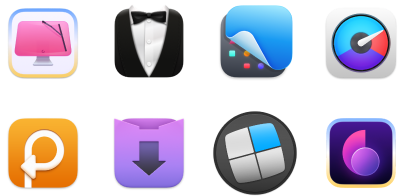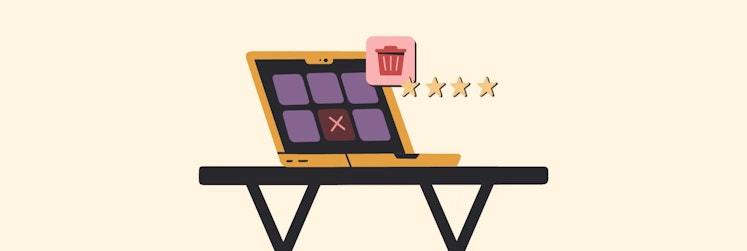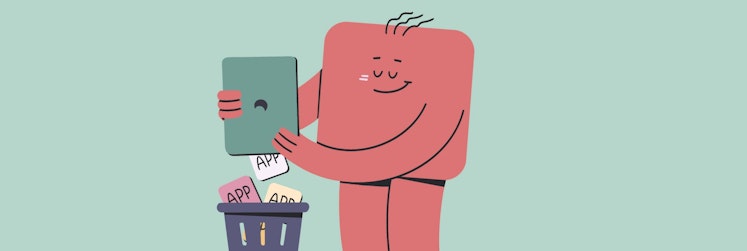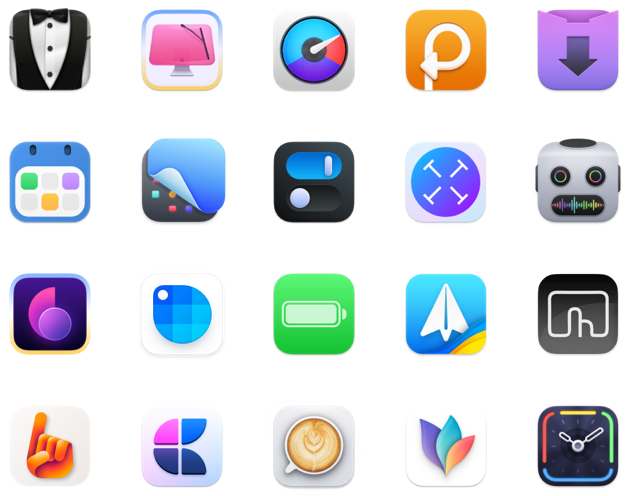Deleted app still showing up on your Mac? How to uninstall apps that won't delete
Can't get rid of an app on your Mac? We have a few solutions that are guaranteed to help. First, we'll cover the classic ways to uninstall apps just to make sure you're doing it right. And then we'll show how to delete undeletable apps on Mac, guaranteed, and wipe out all the leftover files.
How to uninstall apps from Mac
MacOS has two classic ways to uninstall apps: through Launchpad and Finder.
Through Launchpad
Here, you can uninstall apps you got from the App Store but not from the web.
- In Launchpad, click the app you want to uninstall. Or press and hold the Option key.
- Wait until the icon starts to jiggle.
- Click the cross that appears.
You'll only need to confirm the removal of the program.
Through the Finder
Here, you can uninstall almost any program except system ones.
- Open Finder.
- Go to the Applications tab.
- Drag the unwanted app to the Trash. Or, click the app and press Command+Delete.
If this operation was a mistake, press Command+Z immediately, and the app will return. After you delete a program, empty the Trash.
What's wrong with the uninstalling through Launchpad and Finder
The downside of these methods is that they leave garbage in folders you may not even know exist. Over time, they clog up and slow down your Mac. Here are just a few of the folders you should clean out manually:
- ~/Library/Caches
- ~/Library/Logs
- ~/Library/Containers
- ~/Library/Application Support
- ~/Library/Cookies
- ~/Library/LaunchAgents/
To access them, open the Finder, press Shift+Command+G, and paste the desired path. Be careful, you might delete an important file.
Tip. For a safe and effective app removal, we recommend CleanMyMac X. It uninstalls the app with all its remaining files and even finds leftovers of apps you uninstalled manually.
Why can't you uninstall an app on Mac?
Uninstalling via Finder and Lunchpad doesn't always work. Sometimes, the deleted app still shows up on Mac. Sometimes, the deletion is blocked. We've compiled the most common reasons for failed software removal and ways to fix them.
| Issue | Reason | Solution |
|---|---|---|
| Dragging to the Trash does not work | You are probably trying to uninstall a program that is an important part of your Mac's software. Your computer has no built-in ways to delete Safari, App Store, Contacts, Clock, Siri, Calendar, etc. | Please refuse to remove system apps. They don't take up much space, and reinstalling them can be a pain. If you don't want to see them, just put them in one folder in Launchpad. |
| The deleted app is still showing in Launchpad | You might not have cleaned the Trash or leftover files after uninstalling the app. Or you might have uninstalled the program incorrectly. A common mistake is to drag an icon from the Dock to the Trash. This will delete the icon, not the app. It's also possible that this is a bug. | Empty the Trash and get rid of any remaining app files. Try to uninstall the app again using the Finder. Restarting your Mac might help in case of a bug. |
| Can't delete an app on Mac because it's open | The program should be closed before it is removed. Some apps run in the background, so you may not notice that they are active. | Press Command+Option+Esc, select the unwanted program and press Force Quit. or Go to the Launchpad > Activity Monitor > Energy. Select an unnecessary program and click the cross in the top bar to stop it. |
Tip. If you encounter the problem "App can't be moved to Trash because it's open," it's good to have a tool that quickly quits many programs. We recommend QuitAll. It lives in the menu bar and shows all running programs, including those in the background. Any of them can be turned off with a single click.
QuitAll will also come in handy in everyday use to quickly kill unnecessary processes, free up the CPU, and speed up your Mac.
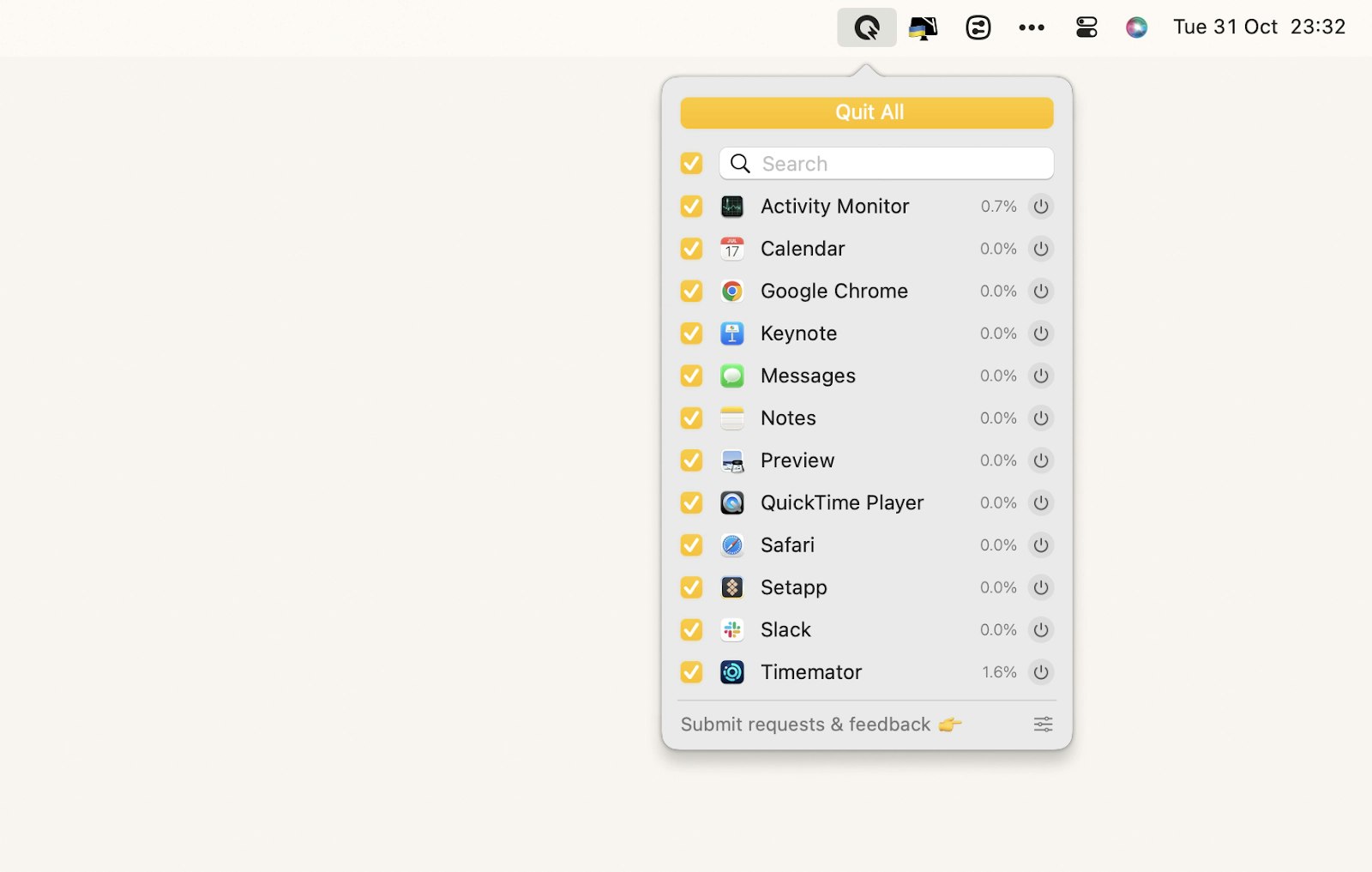
How to delete apps on Mac that won't delete from Launchpad or Finder
If the previous methods didn't work, use this guide on how to delete apps on Mac that won't delete.
Method 1. Force delete programs using Terminal
When working with the Terminal, every character and space is important. Be sure to type the commands exactly as shown in this guide.
- Open Terminal (press Command+Space and type Terminal).
- Type cd /Applications and press Enter to navigate to the Applications Directory.Note. If the Applications folder contains subfolders with apps, specify the path in step 2. In our case, we would type cd /Applications/Setapp or cd /Applications/Utilities:
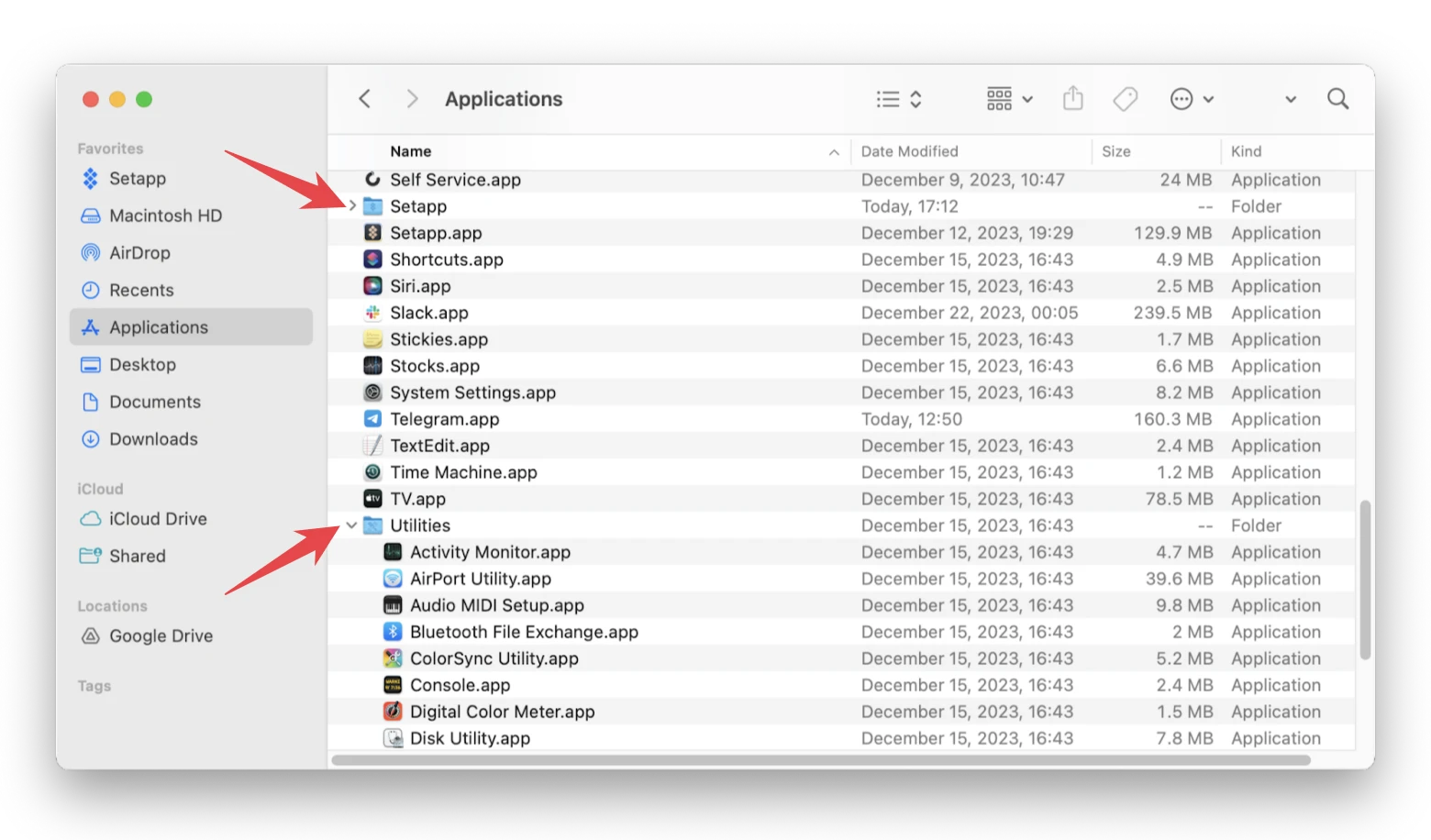
- Type ls and press Enter to list all apps in this directory.
- Find the exact name of the app you want to uninstall. In our example, we have Firefox.app
- Type sudo rm -rf Firefox.app specifying the name of your app.
- Enter your password and press Enter. No characters appear on the screen while you type your password. This is okay.
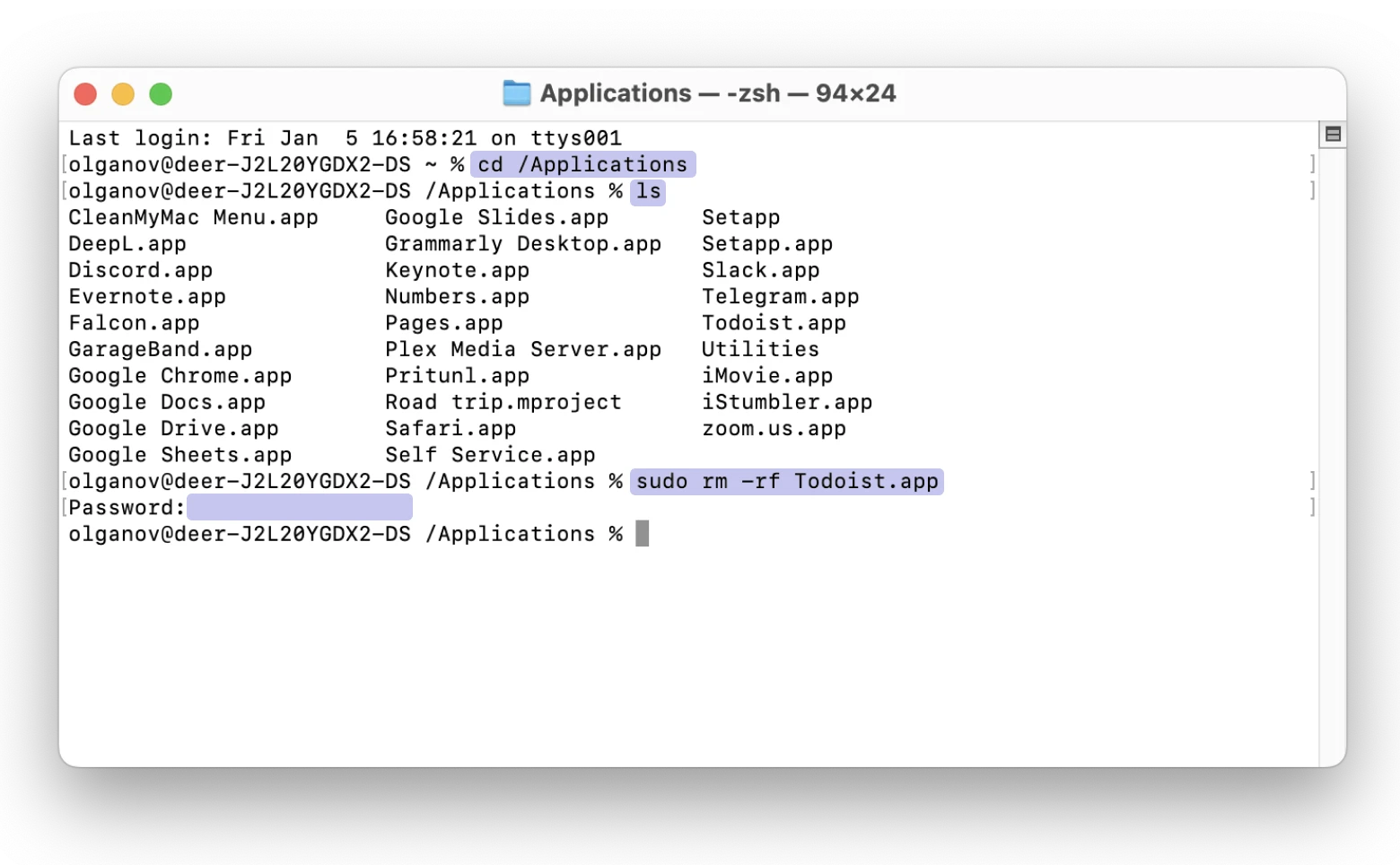
After these steps, the program will be removed. The icon may still appear in the Dock, but it will disappear after you restart your Mac.
However, some folders may still contain files related to the uninstalled app. Ideally, you should go to the cd ~/Library/Application\ Support/ and cd ~/Library/Application\ Support/ and delete them.
But for the average user, it is difficult to determine which of those files are safe to delete.
Method 2. Run the script for the app removal
This is a more automated way to uninstall an app using the Terminal. First, you create a script and then uninstall the app by simply answering its questions.
- Open Terminal.
- Type nano script.sh and press Enter.
- Paste the script:
#!/bin/bash # Ask for the application name read -p "Enter part or full name of the application to delete (e.g., chrome for Google Chrome): " appName # Find applications in the Applications folder (case-insensitive) while IFS= read -r appPath; do appPaths+=("$appPath") done < <(find /Applications -iname "*$appName*.app") declare -a filteredApps # Exclude subdirectory matches for appPath in "${appPaths[@]}"; do isSubDir=0 for filteredApp in "${filteredApps[@]}"; do if [[ $appPath == $filteredApp/* ]]; then isSubDir=1 break fi done if [ $isSubDir -eq 0 ]; then filteredApps+=("$appPath") fi done # Check if any applications were found if [ ${#filteredApps[@]} -eq 0 ]; then echo "No applications found matching \"$appName\"." exit 1 fi echo "Applications to be considered for deletion:" printf '%s\n' "${filteredApps[@]}" # Ask for confirmation for each application for appPath in "${filteredApps[@]}"; do read -p "Do you want to delete $(basename "$appPath")? (y/n): " confirm if [[ $confirm == [Yy]* ]]; then sudo rm -rf "$appPath" echo "$(basename "$appPath") has been deleted." else echo "Skipped $(basename "$appPath")." fi done - Press Ctrl+O to write the file.
- Press Enter to confirm the file name.
- Press Ctrl+X to exit nano.
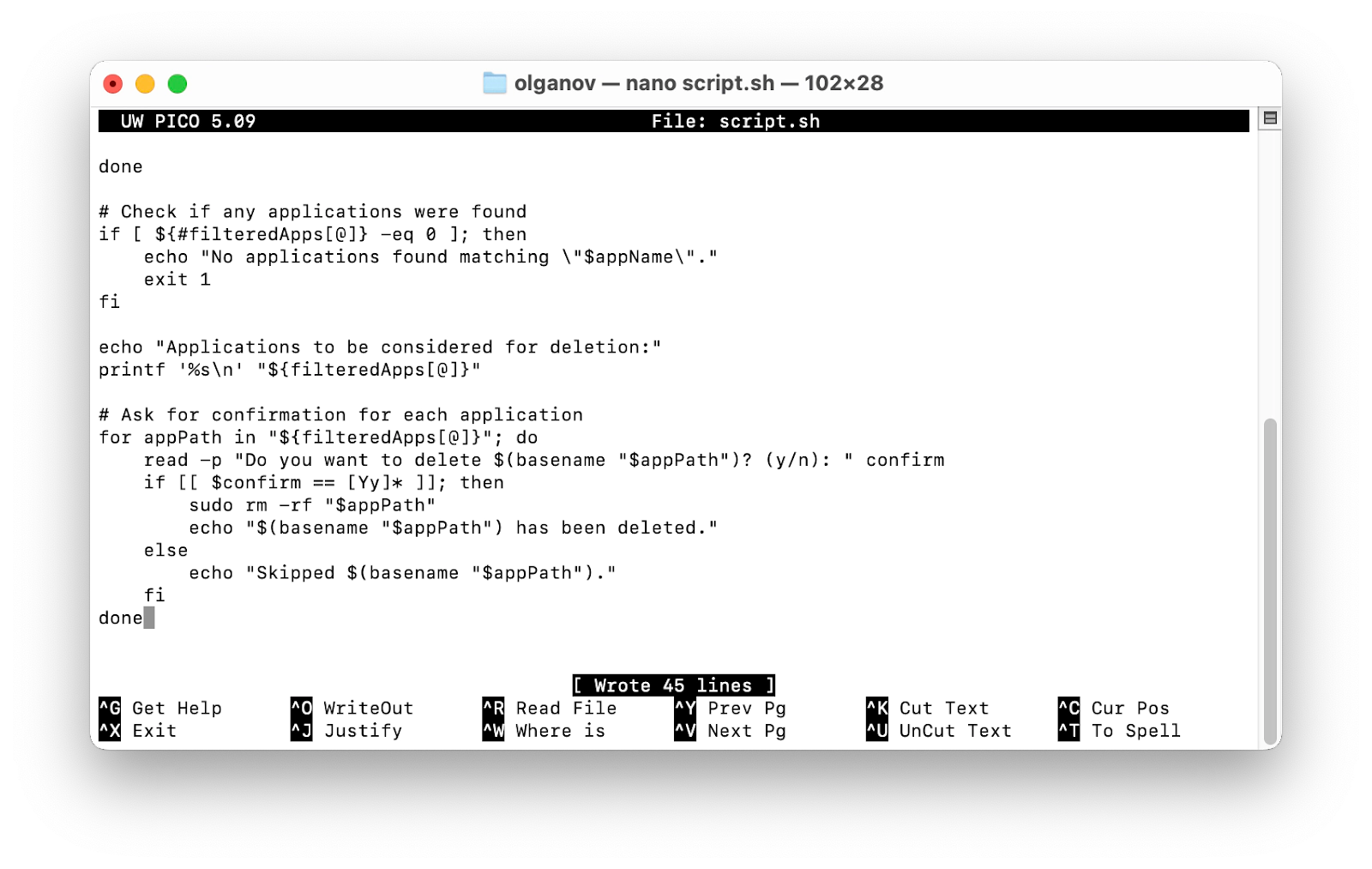
- In Terminal, type chmod +x script.sh and press Enter to make the script executable.
- Type ./script.sh and press Enter to run the script.
Now, you have to answer the Terminal's prompts:
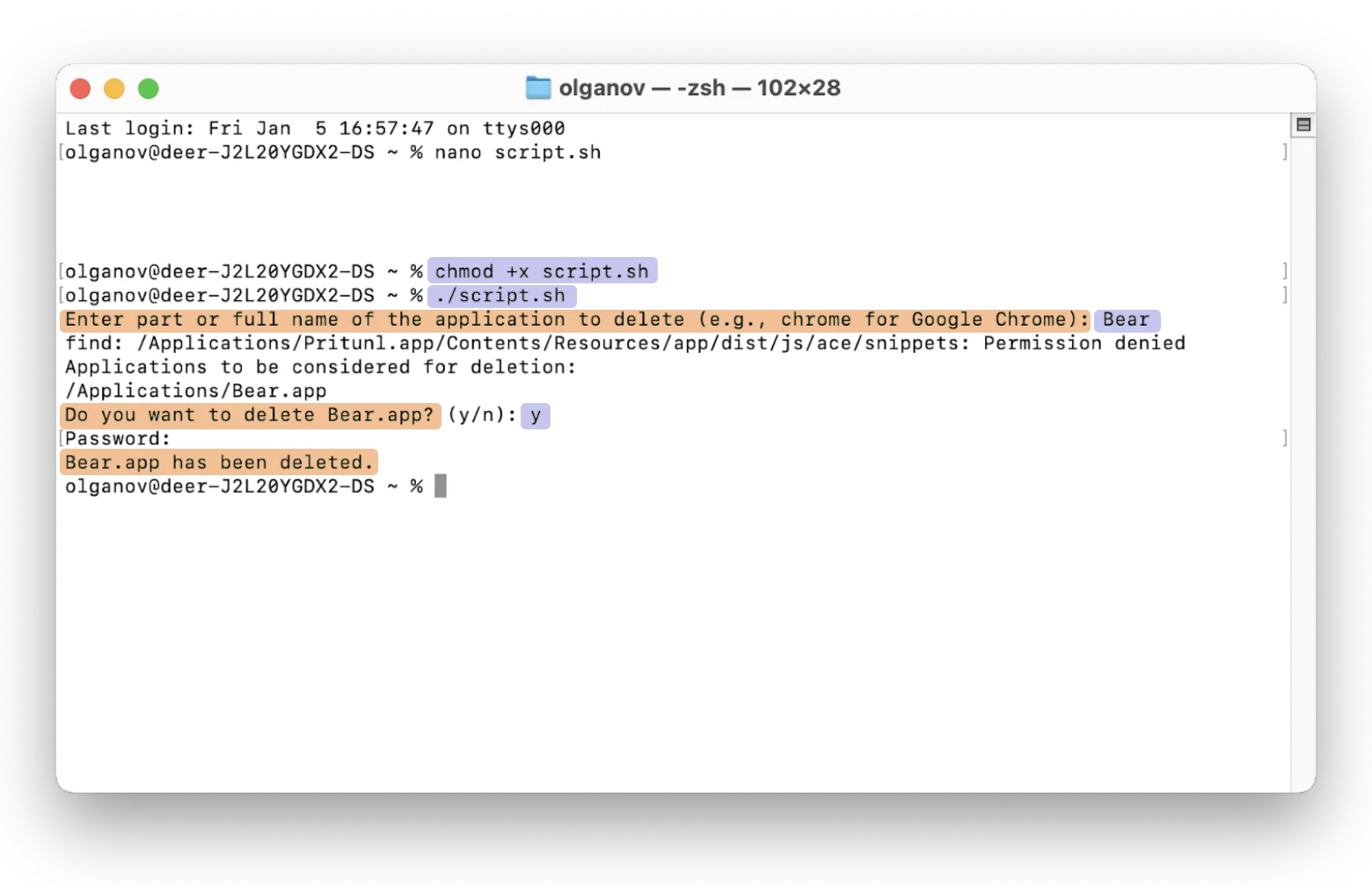
When answering Yes or No, be careful not to delete files with similar names. For example, if your app is named ABC, the script may find an ABCD file if it exists in this directory.
This method is effective but not perfect. For example, it doesn't clear the cache or search for leftover files in other directories. You'll need third-party programs to clean them up anyway.
Method 3. Delete apps with third-party tools
The great thing about third-party tools is that they delete apps with a click, along with all the unnecessary associated files, cache, etc. We recommend two tools: CleanMyMac X and iBoysoft MagicMenu.
CleanMyMac X for removing apps that won't delete
CleanMyMac X removes apps without leaving a trace. We also love that it lets you uninstall multiple apps at once.
- Install and run CleanMyMac X.
- Click the Uninstaller tab.
- Select the unwanted apps and click Uninstall.
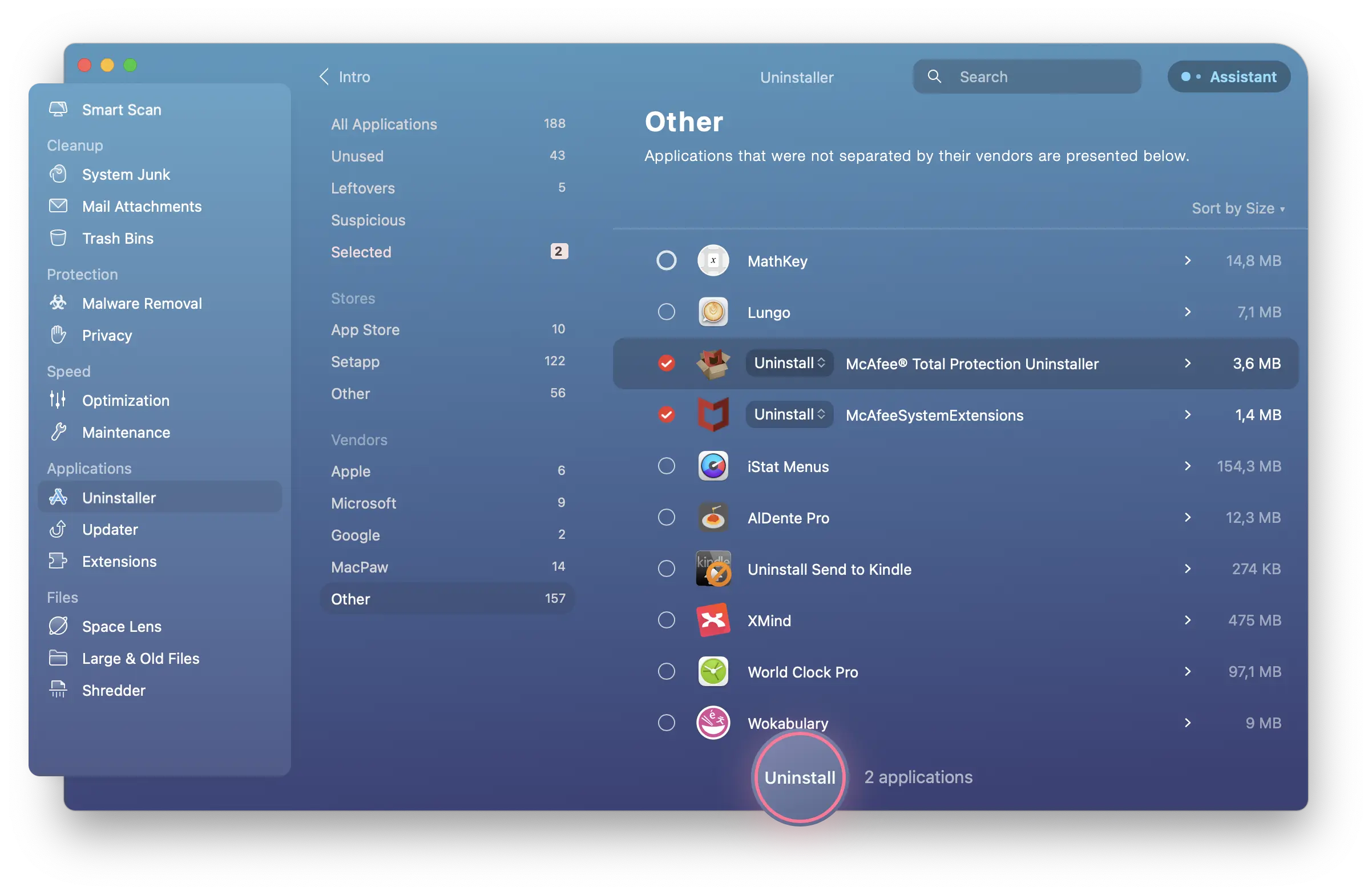
If your goal isn't to get rid of the program but to reinstall it because it's misbehaving, try the Reset feature.
- Select the app you need.
- Select Reset from the drop-down box next to it.
- Click the Reset button.
We also recommend checking if your laptop is clogged with leftover files after manual program uninstallations. In the Uninstaller section, select the Leftovers tab and delete unnecessary files.
During the cleaning process, CleanMyMac X may ask you to quit some apps. That's normal. However, before you click Quit, make sure there are no unsaved files in these programs.
iBoysoft MagicMenu to remove apps with your Mac's right click
iBoysoft MagicMenu allows you to add the Uninstall function to the right click (or two-finger click on the touchpad). All app-related junk files are also cleaned up as if they never existed. Just like that:
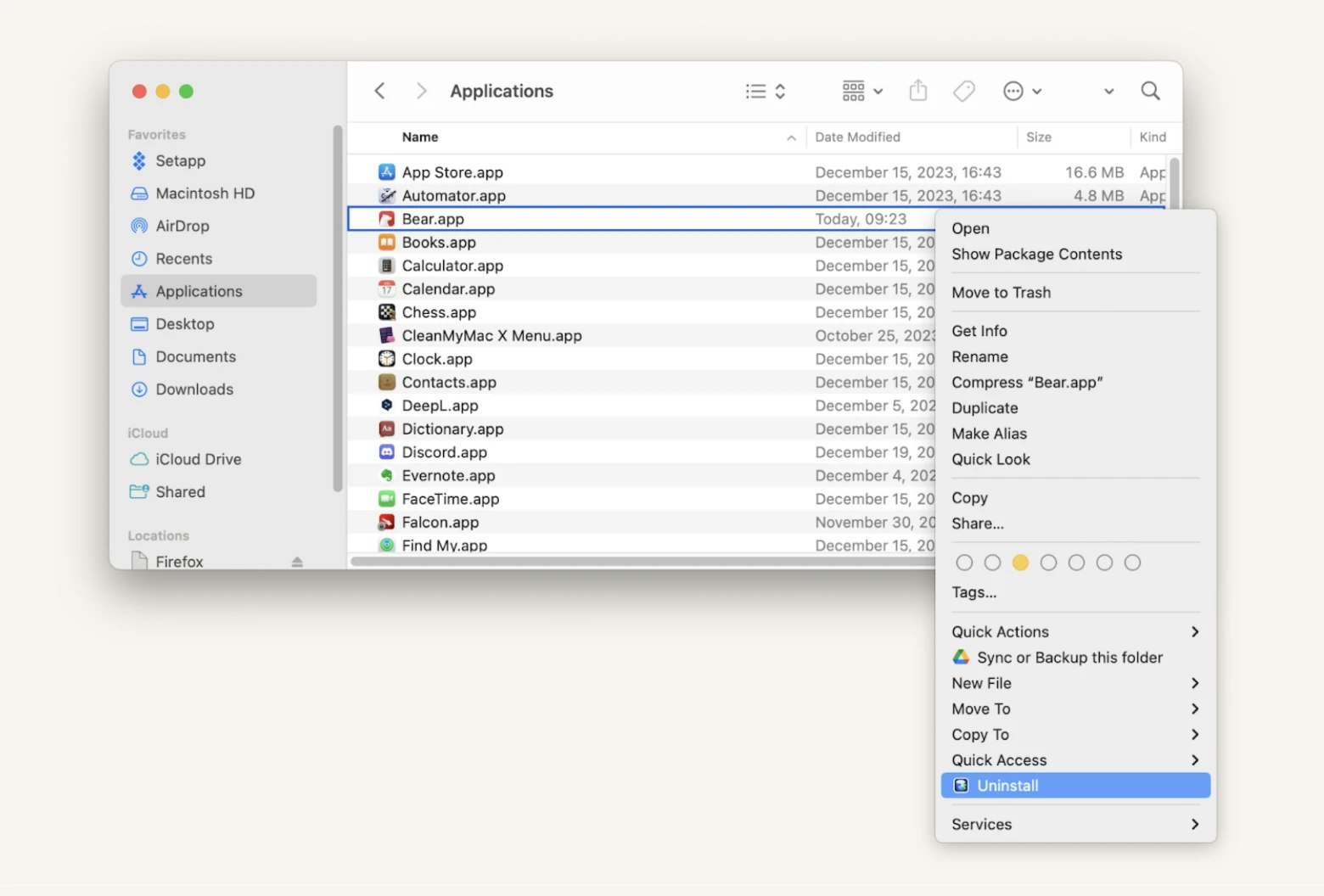
Actually, you can add dozens of other functions, such as Create File, Move, etc., but this story is about something else.
- Install and run iBoysoft MagicMenu.
- Go to the Menu Editor tab.
- Click Add Item > Add from Library in the right menu.
- In the search menu, find Uninstall and click on it.
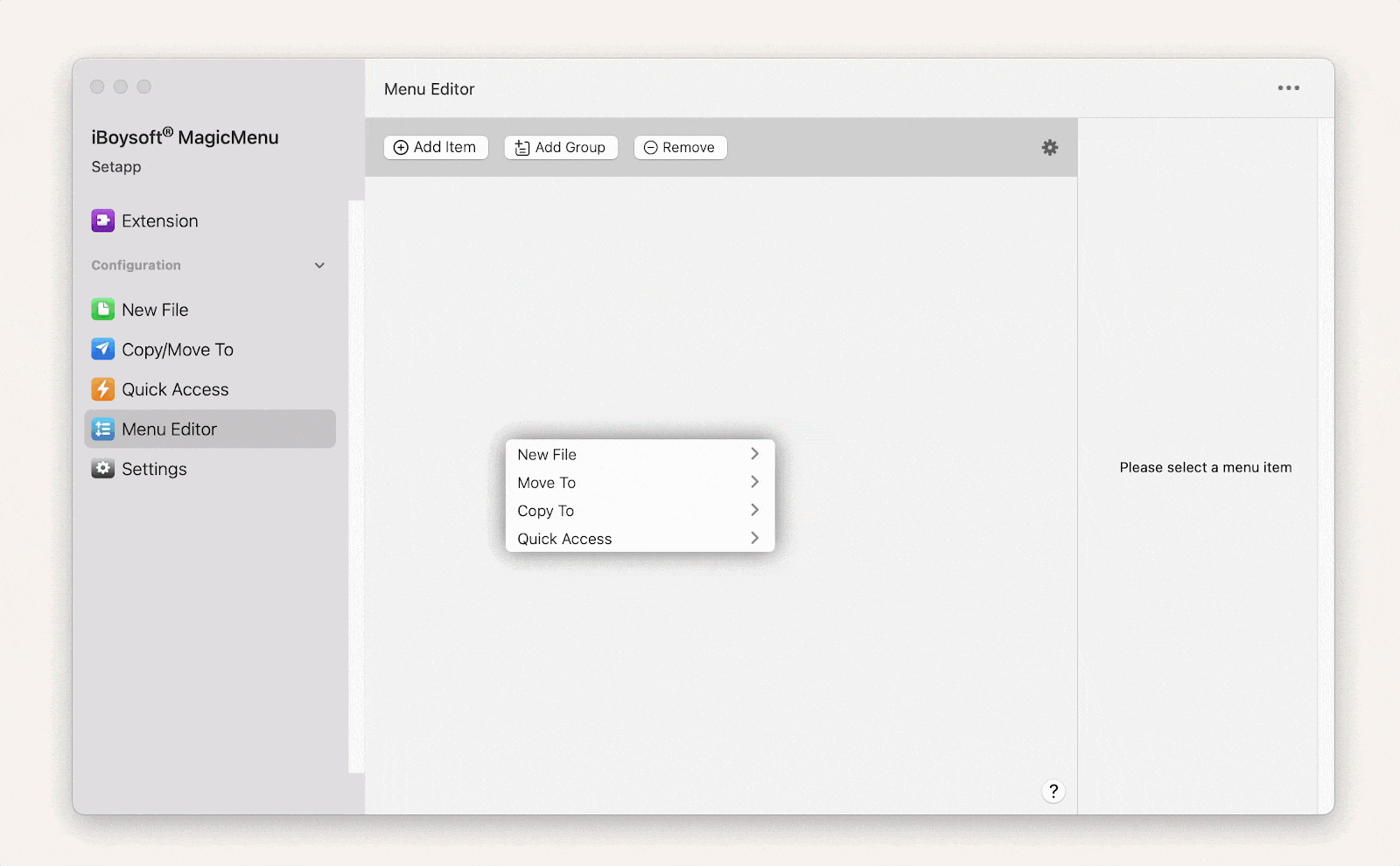
You're done! Now, you can right-click to uninstall apps.
How to delete apps on Mac that won't delete? Solved
The classic method of deleting apps through Finder or Launchpad leaves a trail. These are unnecessary files and folders you don't notice but which, over time, can clutter up your Mac. The same goes for uninstalling from the Terminal.
You can go into some folders (e.g., ~/Library/Caches) and delete some files. But the manual method doesn't guarantee that you'll remove all the leftovers or that you won't accidentally delete a file you need.
On Mac, using a third-party tool is the only reliable way to uninstall a program completely.
We recommend CleanMyMac X or iBoysoft MagicMenu. They're fast and safe, and they remove everything you don't need. Both tools are part of Setapp, a platform with dozens of Mac apps with a single subscription. Try them free for 7 days. You'll have access to all the same features as paid subscribers. Sign up to get started.
FAQs
How to uninstall app that I can't delete?
Try using the Terminal by typing the following commands in sequence: cd /Applications > ls > sudo rm -rf AppName.app. The most effective way to uninstall software is to use a third-party uninstaller. We recommend CleanMyMac X or iBoysoft MagicMenu.
How to delete apps on MacBook Pro that won't delete?
The principle of deleting apps is the same for all modern Macs. The most effective way to uninstall programs is to use third-party tools such as CleanMyMac X or iBoysoft MagicMenu.
You can also try to uninstall using the Terminal. Type the following commands: cd /Applications > ls > sudo rm -rf AppName.app.
It's also worth checking if your app has a built-in uninstaller.
